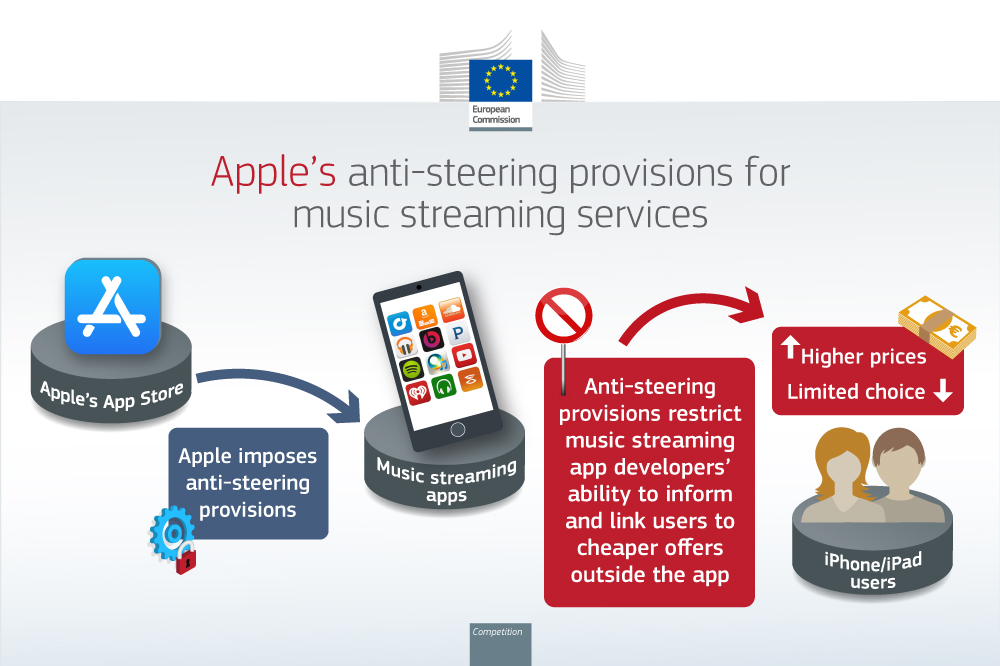From time to time, financial sanctions are imposed against the internet giants, both in France and at the European level. This is the case of Apple, for example, in March 2024, in a case opposing it to Spotify. Once all legal remedies have been exhausted, where does the money go?
More than 1.8 billion euros. This is therefore the amount revealed this Monday March 4 by the European Commission in the case between Apple and Spotify. This sum, which the Cupertino company will in principle have to pay, aims to sanction it: Brussels has concluded that the rules of the App Store are abusive against platforms providing streaming music.
In this case, ” For a decade, Apple abused its dominant position by preventing developers from informing consumers about alternative, cheaper music services available outside of the Apple ecosystem. This practice is illegal under EU antitrust rules. “, summarized the Commission.

However, the matter is not over. In a press release, Apple developed a lengthy argument to challenge Brussels’ analysis — and announced its intention to appeal. Therefore, the final amount of this sanction is likely to change, upwards or downwards. The fine itself could also be canceled.
Beyond the present case, and whatever the final amount which will be retained (or not), this case poses a question whose answer is undoubtedly unknown to most people: where does the money go?
Who receives the money from the fines imposed by the European Commission?
At the European level, once all remedies have been exhausted and barring any dramatic events, the fines “ are paid into the community budget and therefore contribute to financing the European Union and reducing the tax burden on individuals “, explain the Brussels services. These fines actually represent less than 3% of the EU budget, which amounts to just under €167 billion.
Among these 3%, we also find taxes paid by Union staff on their remuneration, contributions from third countries to certain programs and the balance from the previous financial year. Most of the budget is made up of the contribution of the Member States. Customs duties and VAT follow. It is therefore not on the fines against Google & co that the Union is banking on its functioning.


Sanctions do not always have a direct impact on the financing of the Union. In the case involving Apple and Ireland, the Commission noted that the 13.4 billion euros in question constituted tax advantages, put in place by Dublin to attract the Cupertino firm, which violated the rules on state aid.
Although spectacular, the fine imposed on Apple is not a first. Brussels has already taken financial sanctions reaching or exceeding a billion euros against tech giants. We can think of Intel for an abuse of a dominant position or Google which took a series of three fines exceeding 8 billion euros in total.
Decisions of the European Commission can be challenged at the level of the General Court of the European Union.
Where does the money go when the CNIL issues a fine?
A financial penalty of 50 million euros pronounced in early 2019 by the CNIL, because Google violated the General Data Protection Regulation (GDPR). 100,000 euros against Darty, for a failure to secure personal data. And a “note” of 400,000 euros presented to Uber following a hack.
Since 1978, the year of its foundation, the National Commission for Information Technology and Liberties (Cnil) has had the ability to impose sanctions in the event of a breach of the law. An ability that she uses occasionally. But where does this money go? Does he finance the CNIL? Is it returned to the State? Is it being used for the benefit of companies or organizations competing with the entity that has been sanctioned?


First, we must ensure that the money can be recovered. There are legal remedies available to convicted entities to enable them to assert their rights again: in France, a sanction from the CNIL can be appealed to the Council of State. It is the highest court in the French administrative order.
If these appeals have not delayed or prevented the moment when payment must take place, you should know that these amounts, when they come from decisions of the CNIL, are paid to the French budget. In the general State account there is a line entitled “ financial sanctions imposed by independent administrative authorities. “.
This line therefore includes the financial sanctions imposed by the CNIL, due to its status as an independent administrative authority. This line, which appears in the “other sovereign products” section, covers the activities of 27 entities, such as the Competition Authority, the Defender of Rights, the High Authority for the Transparency of Public Life, or the Nuclear Safety Authority.
Do you want to know everything about the mobility of tomorrow, from electric cars to e-bikes? Subscribe now to our Watt Else newsletter!
